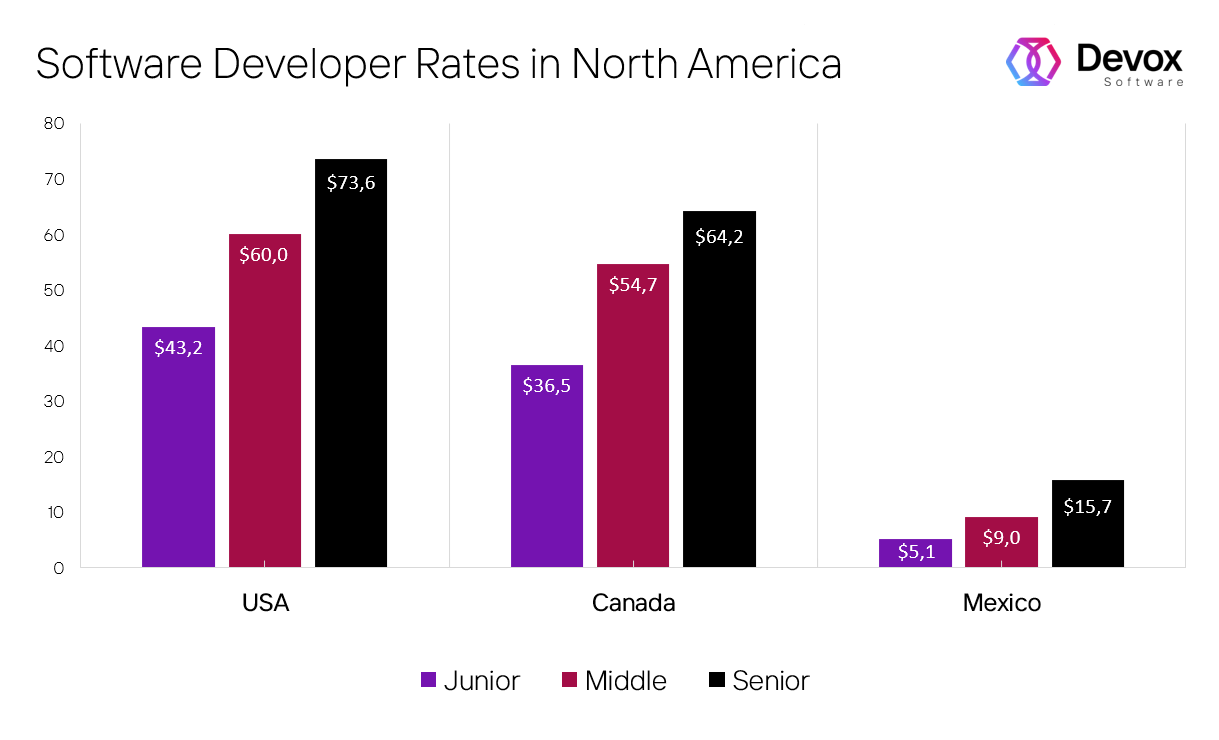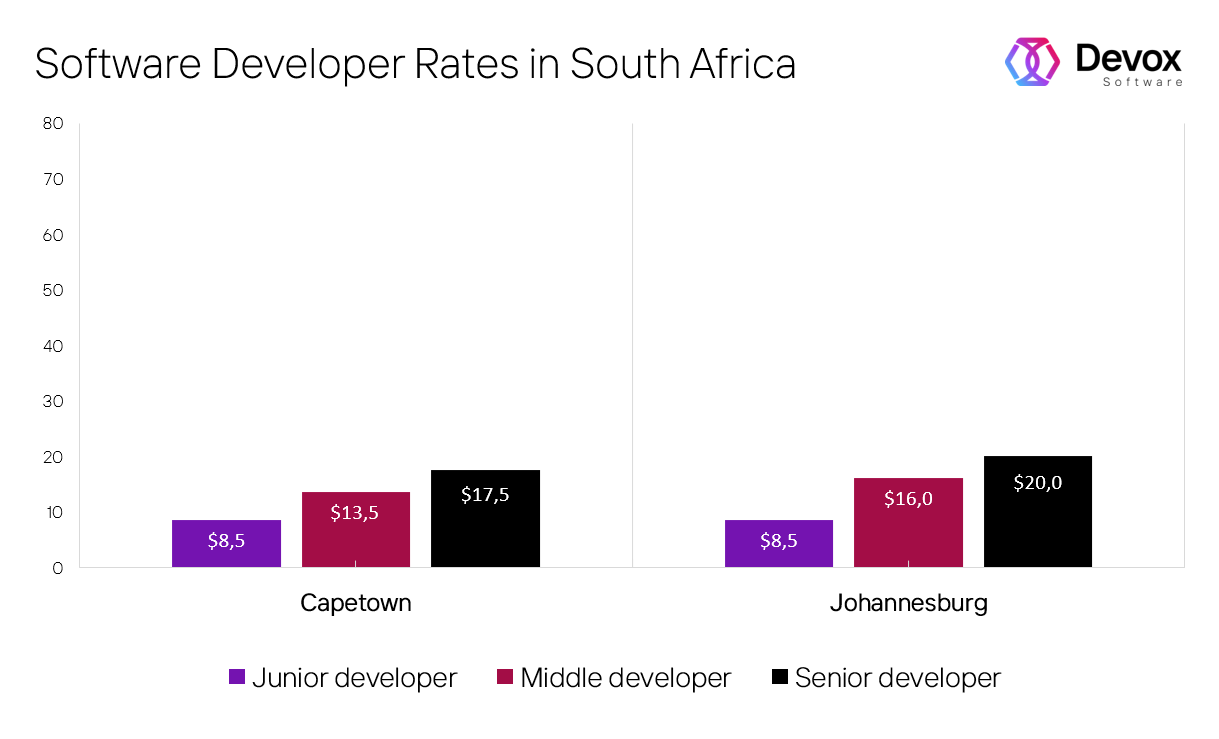Table of content
But how much is personalized software worth and can your business budget cover an average software developer’s hourly rate? Should you opt for a freelancer or a middle-sized lT consulting company? Or should you follow the safest path and turn to one of the trusted front-players? (Sometimes it seems like it’s the only game in town, right?). But can you hire dedicated developers without going bust? We all know that their rates can scrape the sky. And why not just decide on offshoring and nearshoring? Why pay monstrous bills when you can order the same solutions for half a price?
As you see, there are a plethora of alternatives when it comes to creating a tech solution for your business. That is why we have come up with this comparison article to help you make the right call.
Offshore Software Development Rates By Country
Our article is based on the research that attempts to define an average hourly pay for a programmer. The report provides detailed information regarding the major factors influencing the fee and briefs our readers on the general IT services market in the chosen region. Our experts have fetched valuable data from such trusted and reputable resources as Indeed.com, Neuvoo.co.uk, and others.
The insights obtained allowed us to present a breakdown of an average coder hourly rate in 7 regions. The places of interest include North and South America, Asia, Eastern, and Western Europe as well as Africa, Australia, and New Zealand. You’ll find data on the minimum and maximum rate that junior, middle and senior coders charge. To make the information more digestible, we present all salary data in USD.
SOFTWARE DEVELOPER RATES IN THE GREATEST OUTSOURCING COUNTRIES ALL OVER THE PLANET
North America
Overall, North America is deemed to have the strongest economy in the world. Few episodes in human history can compare in their glory and impressiveness with the economic turnaround of North America since the 16th century. What once used to be an agricultural hub, has grown into a stately region with a well-developed economy.
As for the IT-market spotlight, North America remains the world’s most advanced software-and-services hub. In the United States alone, the tech sector generates about $2.12 trillion in direct economic value, or 8.6 % of national GDP, and employs more than 9.6 million professionals (projected to 9.9 million in 2025). As CompTIA states, the country is home to roughly 702 000 tech business establishments with payroll.
Experts now project the North American IT-services sector to swell from roughly USD 552 billion in 2025 to USD 783.8 billion by 2030, a compound annual growth rate of about 7.3 percent. Surging cloud-migration budgets, aggressive AI-platform roll-outs, and ubiquitous zero-trust programs underpin this momentum.
North American IT companies navigate a harmonized market and are well-known for presenting stalwart and viable solutions that dominate the marketplace. The keen interest in technological know-how, competitive approach, and ever-growing demand for custom-software will incentivize the growth of the IT sector in North America.
The USA
| City | Junior developer | Middle developer | Senior developer |
| Tampa | $39-$48 | $50-$60 | $56-$71 |
| Los Angeles | $52-$63 | $68-$88 | up to $89 |
| Alabama | $40-$49 | $43-$56 | $54-$70 |
| Carson | $48-$61 | $51-$65 | $65-$82 |
| Dallas | $37-$49 | $52-$59 | $60-$77 |
| Michigan | $32-$43 | $46-$55 | $57-$77 |
| Milwaukee | $32-$43 | $46-$57 | up to $70 |
| San Diego | $41-$46 | $52-$71 | up to $77 |
| Portland | $39-$49 | $50-$71 | $57-$77 |
| Chicago | $39-$49 | $51-$66 | $61-$79 |
| Colorado | $39-$48 | $51-$63 | $63-$81 |
| California | $43-$54 | $56-$71 | $67-$85 |
| San Francisco | $46-$67 | $67-$83 | $79-$109 |
| New York | $43-$57 | $57-$77 | $74-$89 |
As of mid‑2025, the average hourly rate for software developers in the U.S. sits at $53.77, with the median annual salary reaching $133,080, and top-tier professionals earning over $211,000. Rates vary across cities and experience levels: junior developers typically start around $35-45/hour, mid-level engineers command $50-65/hour, while senior talent often exceeds $70/hour, especially in high-demand metro areas like San Francisco or New York.
In 2024, the U.S. generative AI market was valued at approximately USD 7.41 billion, with projections indicating it could grow to around USD 302.31 billion by 2034. This reflects a remarkable compound annual growth rate of 44.9% between 2025 and 2034, positioning the U.S. as a key engine of global AI-driven innovation over the next decade.
According to Statista, the U.S. IT outsourcing market is projected to generate $218.02 billion in revenue by 2025, maintaining its position as the global leader. This dominance is driven by the country’s highly skilled workforce and advanced technological infrastructure. The market is forecast to grow at a CAGR of 6.24% through 2030, reaching $295.06 billion. Additionally, average spend per employee is expected to hit $1.25k in 2025, signaling strong enterprise investment in outsourced IT services to boost efficiency and productivity.
In Los Angeles, junior developers earn between $52 and $63 per hour, while middle-level professionals charge $68 to $88. Senior developers in LA can make up to $89 per hour.
In Alabama, hourly rates range from $40 to $49 for junior developers and $43 to $56 for mid-level roles. Senior developers command between $54 and $70 per hour.
In Carson, junior-level software engineers charge $48 to $61. Mid-level developers ask for $51 to $65, and senior specialists can expect between $65 and $82.
In Dallas, the hourly wage ranges from $37 to $49 for junior developers, $52 to $59 for mid-level, and $60 to $77 for senior developers.
In Michigan, junior developers earn $32 to $43, middle-level developers $46 to $55, and senior developers between $57 and $77 per hour.
In Milwaukee, both junior and middle-level specialists charge between $32–$43 and $46–$57 respectively, while senior-level coders can make up to $70 per hour.
In San Diego, junior developers charge $41 to $46 per hour. Mid-level specialists earn between $52 and $71, and senior developers can reach up to $77.
In Portland, junior rates range from $39 to $49, while middle developers typically charge $50 to $71. Senior developers in Portland earn $57 to $77.
In Chicago, junior specialists earn between $39 and $49 per hour, middle-level developers make $51 to $66, and senior-level professionals command $61 to $79.
In Colorado, hourly rates start at $39 to $48 for junior roles and increase to $51 to $63 for middle-level developers. Senior specialists can charge $63 to $81.
In California, junior developers earn $43 to $54, while mid-level coders make $56 to $71. Senior professionals in the state can earn $67 to $85 per hour.
In San Francisco, junior software engineers command $46 to $67 per hour, while mid-level developers make $67 to $83. Senior engineers in SF can reach rates of $79 to $109.
In Tampa, developers charge $39 to $48 (junior), $50 to $60 (middle), and $56 to $71 (senior) per hour.
Finally, in New York, junior developers earn between $43 and $57 per hour. Mid-level roles offer $57 to $77, and senior specialists can charge $74 to $89.
New Mckinsey report shows that by 2040, AI software and related services are expected to drive between $1.5 trillion and $4.6 trillion in annual global revenue—putting sustained pressure on companies to scale their engineering capacity. Software development doesn’t just generate profit on its own; it underpins the growth of entire industries like e-commerce, digital payments, and autonomous systems. Cloud platforms and software services now act as the foundational layer for many of the world’s most dynamic sectors. In this landscape, companies that secure early market entry and global access to highly skilled developers gain a durable edge—further intensifying the demand for top-tier software talent across regions.
Canada
| City | Junior developer | Middle developer | Senior developer |
| Toronto | $27-$45 | $47-$60 | $60-$70 |
| Ottawa | $31-$45 | up to $64 | $57-$80 |
| Montreal | $27-$44 | $40-$53 | $49-$69 |
Canada is rightly called one of the richest countries in the world. Indeed, this highly advanced country is blessed with natural and human resources. During its rich and vibrant history, Canada has been prosperous in many senses. Today, it is one of the world’s richest nations, with a highly-developed economy and a first-rate quality of living.
If we shift the focus to the tech industry, Canada keeps up with the latest technologies as well. Its tech sector energizes the general economy, provides high-paying positions for tech gurus, and continues to grow tremendously, surpassing most sectors along its way. If we look at the top tech markets in North America, we’ll see four Canadian hubs making it to the top 20. All this makes Canada shine as a beacon of economic stability and a country with an untapped tech talent pool.
Now let us have a closer look at the average software developer hourly rate in the fertile ground of Canada.
In Toronto, ON, the average annual salary for a software engineer is $103,005, aligning closely with the national average. As of July 2025, over 1,700 reported salaries confirm this benchmark, reflecting steady demand and competitive compensation in one of Canada’s leading tech hubs. With a strong presence of global companies and startups alike, Toronto continues to offer robust career opportunities for software engineers looking to grow their skills and income.
In Ottawa, Canada’s capital and a recognized center for high-tech industries, hourly wages remain competitive. Junior developers earn between $31 and $45 per hour, mid-level professionals charge up to $64, while senior developers earn from $57 to $80 per hour.
Montreal continues to thrive as an alternative to Silicon Valley, combining geographic advantage with a strong talent pool. Junior programmers here earn $27 to $44 per hour, mid-level developers earn between $40 and $53, and senior engineers charge $49 to $69 per hour.
Toronto remains Canada’s largest tech hub, drawing top talent and international companies alike. Junior developers in Toronto earn $27 to $45 per hour, while mid-level professionals charge $47 to $60. Senior developers command rates ranging from $60 to $70 per hour.
Mexico
| City | Junior developer | Middle developer | Senior developer |
| Mexico City | $2.9-$7.0 | $7.0-$11.7 | $10.5-$22 |
| Guadalajara | $3.5-$7.0 | $7.0-$10.5 | $9.4-$21 |
Over the past few years, Mexico has steadily gained recognition as an emerging technology hub. With a vibrant startup ecosystem and growing IT sector, it has become an attractive destination for companies seeking cost-effective development talent.
In Mexico City, hourly developer rates range from $2.9 to $7.0 for junior specialists. Middle-level developers typically earn between $7.0 and $11.7 per hour, while senior engineers charge $10.5 to $22 for their services.
Guadalajara, another major tech hub in Mexico, offers similar compensation. Junior developers here earn between $3.5 and $7.0 per hour, middle-level engineers make $7.0 to $10.5, and senior-level professionals command $9.4 to $21 per hour.
While significantly lower than North American or Western European averages, these rates reflect a growing and maturing tech ecosystem. Mexico’s developer market benefits from a large talent pool, time zone alignment with U.S. clients, and a strong nearshoring appeal — making it an attractive option for cost-efficient development partnerships.
Australia and New Zealand
Both Australia and New Zealand are widely known as countries of breathtaking views and unique lifestyle. They boast a well-developed economy and are rich in natural resources. As for the IT sector, it is diverse and advanced in both locales. This creates a breeding ground for investments and helps compete successfully on the world tech stage.
Australia
| City | Junior developer | Middle developer | Senior developer |
| Sydney | $27-$40 | $39-$53 | $64-$73 |
| Melbourne | $27-$40 | $37-$54 | up to $68 |
| Perth | $27-$37 | $42-$50 | $47-$61 |
According to Australian Talent,the average software engineer salary in Australia in 2025 is $123,090 per year or $63.12 per hour. Entry-level positions start at $122,087 annually, while the most experienced engineers can earn up to $193,900 per year.
In Australia, the highest demand for coders is concentrated in Sydney, Melbourne, and Perth. In Sydney, junior developers earn between $27 and $40 per hour, mid-level developers charge $39 to $53, while senior professionals make $64 to $73 per hour.
In Melbourne, junior specialists also earn $27 to $40, middle developers command $37 to $54, and senior engineers earn up to $68 per hour.
Perth offers slightly lower entry rates: junior developers charge $27 to $37, mid-level professionals earn $42 to $50, and senior developers receive $47 to $61 per hour.
New Zealand
| City | Junior developer | Middle developer | Senior developer |
| Auckland | $18-$25 | $26-$40 | $46-$57 |
| Wellington | $18-$26 | $30-$37 | $33-$47 |
Payscale ranks the average software developer salary in New Zealand as $30.57 per hour and $74,967 per year. NZ junior developer works for $18-$26 per hour, middle for $26-$37, senior for $46-$57.
Teleport data suggest that an Auckland software developer earns between $18 and $25 per hour at the junior level. Mid-level developers in the city charge $26 to $40, while senior specialists earn $46 to $57 per hour.
In Wellington, hourly rates for junior developers range from $18 to $26, mid-level professionals charge $30 to $37, and senior engineers make between $33 and $47 per hour.
Western Europe
The region of Western Europe is one of the richest locations in the world. After several periods of uncertainty, the region has leaped where it is now – strong, positive, and well-advanced economically-wise. Today, the continent of Europe and the Western area in particular are considered one of the most prosperous global locales.
Germany
| City | Junior developer | Middle developer | Senior developer |
| Berlin | $21-$30 | $32-$47 | $50-$77 |
| Munich | $19-$25 | $27-$45 | $50-$77 |
Germany is one of the most favorite IT destinations in Europe and for a good reason. The country is home to around a quarter of the European market by value. Cutting-edge technology comes as a staple in the tech industry known for a flourishing Mittelstand of small and average-sized businesses.
According to Payscale and Glassdoor resources, developer salaries in Berlin range from $21 to $30 per hour for junior-level roles. Middle-level engineers typically charge $32 to $47, while senior developers earn between $50 and $77 per hour.
In Munich, junior developers earn $19 to $25 per hour, mid-level professionals charge $27 to $45, and senior engineers receive between $50 and $77 per hour — matching Berlin’s upper-tier compensation.
Norway
| City | Junior developer | Middle developer | Senior developer |
| Bergen | $19 – $28 | $32 – $43 | $47 – $61 |
| Oslo | $24 – $32 | $37 – $47 | $50 – $80 |
Opposed to Norway’s traditional hubs – petroleum, maritime, seafood – the Norwegian tech sector, though huge, money-generating, and knowledge-driven, does not consider itself as a hub and does not act like one. Nevertheless, a large and fast-paced industry is becoming increasingly prominent in the Norwegian economy.
According to recent data, junior developers in Bergen earn between $19 and $28 per hour, while middle-level specialists charge $32 to $43. Senior-level developers in the city earn $47 to $61 per hour for their expertise.
In Oslo, junior developers make $24 to $32 per hour, mid-level engineers typically charge $37 to $47, and senior software developers command $50 to $80 per hour, making it one of the highest-paying cities for tech talent in Norway.
Spain
| City | Junior developer | Middle developer | Senior developer |
| Madrid | $11 – $19 | $21 – $31 | $34 – $36 |
| Barcelona | $15 – $21 | $26 – $34 | $34 – $41 |
Boasting more than 34,000 ICT companies, Spain is undoubtedly one of the most notable ICT markets by volume in Europe.
In Madrid, junior developers earn between $11 and $19 per hour, while mid-level programmers charge $21 to $31. Senior developers receive between $34 and $36 per hour, reflecting a narrower but stable high-end range.
In Barcelona, compensation is slightly higher across all levels. Junior specialists earn $15 to $21, middle-level developers charge $26 to $34, and senior programmers can make between $34 and $41 per hour.
United Kingdom
| City | Junior developer | Middle developer | Senior developer |
| London | $34 – $51 | $52 – $72 | $63 – $85 |
| Manchester | $27 – $33 | $36 – $54 | $52 – $68 |
| Liverpool | $27 – $38 | $38 – $54 | $50 – $78 |
According to industry analysis, the UK IT services market is projected to reach USD 112.5 billion in 2025, up from approximately USD 105 billion in 2024, with a robust CAGR of ~6.8–7.9% through 2030. This growth reflects accelerating digital transformation, increased cloud adoption, and rising investments in cybersecurity and AI across sectors.
Three major IT hubs in which businesses are actively hiring developers include London, Manchester, and Liverpool.
Data from Neuvoo, Totaljobs, and CWJobs show that the UK software developer hourly rate in London ranges from $34 to $51 for junior-level specialists. Mid-level developers typically charge between $52 and $72 per hour, while senior professionals earn $63 to $85, depending on experience and project scope.
In Manchester, junior coders charge $27 to $33 per hour, while mid-level developers make between $36 and $54. Senior-level programmers in the city earn from $52 to $68 per hour.
Liverpool also presents competitive developer wages. Junior programmers charge $27 to $38, mid-level specialists make $38 to $54, and senior professionals earn between $50 and $78 per hour, making it a strong regional hub for affordable yet skilled tech talent.
Eastern Europe
The economic situation in Eastern Europe has been grabbing headlines over the last 5 years. Unfortunately, we can observe a marked surge in the jobless rate and weaker salary dynamics. Besides, unforeseen flare-ups of the pandemic befog the outlook like in any other part of the world. The IT industry, on the contrary, is experiencing reigniting growth, making Eastern Europe one of the top IT outsourcing destinations in the world.
Poland
| City | Junior developer | Middle developer | Senior developer |
| Krakow | $14 – $22 | $22 – $37 | $49 – $50 |
| Warsaw | $17 – $25 | $26 – $37 | $43 – $55 |
| Wroclaw | $10 – $17 | $16 – $25 | $39 – $49 |
Vast human resources and high-quality IT specialists, in particular, have been the driving force behind the Polish IT industry. The country has leaped to establish itself as a tech hub enticing significant expertise and resources from foreign countries.
Data from Glassdoor and Payscale show that in Krakow, junior software developers now earn between $14 and $22 per hour. Middle-level developers charge $22 to $37, while senior engineers receive around $49 to $50 per hour.
In Warsaw, junior developers make $17 to $25, mid-level professionals earn $26 to $37, and senior developers command $43 to $55 per hour, reflecting the city’s status as Poland’s top IT hub.
Wroclaw offers slightly more affordable rates. Junior developers charge $10 to $17 per hour, mid-level coders earn $16 to $25, and senior specialists make between $39 and $49 per hour.
Ukraine
| City | Junior developer | Middle developer | Senior developer |
| Kyiv | $10 – $17 | $20 – $34 | $35 – $43 |
| Kharkiv | $7 – $12 | $20 – $31 | $33 – $37 |
| Lviv | $9 – $13 | $20 – $33 | $34 – $38 |
Ukraine is hightailing it for leadership in the modern outsourcing era. With low-priced resources galore, this country has come out at the top as an A-list IT sourcing destination which inspires good business investment. Boasting over 4,000 tech firms, Ukraine is the emerging Europe tech hub.
In Kyiv, developer earnings remain among the highest in Ukraine. Junior-level coders charge between $10 and $17 per hour, middle-level developers earn $20 to $34, while senior specialists receive $35 to $43 per hour, depending on skills and domain expertise.
In Kharkiv, junior developers earn $7 to $12, mid-level programmers charge $20 to $31, and senior engineers command $33 to $37 per hour.
In Lviv, junior developers make $9 to $13 per hour, mid-level engineers earn $20 to $33, and senior-level specialists charge between $34 and $38 per hour, offering a balanced mix of affordability and technical expertise.
South America
Next on our list of offshore software development rates is the charming region of South America. South America boasts a great biological and geographic diversity that is the result of the vast land surface this area accounts for. The proximity to the US allows South America to be proactive in various industries, especially manufacturing. However, as we all know from history classes, the turbulent history of this region has led to unrest, the huge cleft between the rich and poor, and general dissatisfaction with the government.
Despite economic uncertainty, Latin American countries have firmly entered the global tech race. The region’s software sector continues to expand, propelled by the fact that modern IT services require neither heavy infrastructure nor physical presence. According to recent forecasts, the Latin American IT services market is expected to grow by USD 55.2 billion between 2024 and 2029, at a solid CAGR of 8.5%.
This growth is fueled by a renewed enterprise focus on core competencies and operational efficiency. The rapid adoption of emerging technologies—such as AI, 5G, blockchain, augmented reality, and robotic process automation—is reshaping how services are delivered and managed. AI in particular is playing a transformative role in information management, helping companies automate workflows and derive actionable insights.
At the same time, challenges like inconsistent Service Level Agreements (SLAs) and the lack of clear quality standards still pose obstacles to long-term customer satisfaction. To remain competitive, IT service providers in the region must continuously innovate while strengthening trust through service reliability and performance transparency.
Argentina
| City | Junior developer | Middle developer | Senior developer |
| Buenos Aires | $5 – $8 | $9 – $14 | $14 – $19 |
| Cordoba | $5 – $6 | up to $12 | $7-$9 |
With a GDP of >$683 billion, Argentina has one of the largest economies in South America. Boasting large natural resources, this country is a leader in agriculture and food production. Like Brazil, Argentina has a vast amount of untapped economic possibilities, but the historical volatility of economic growth have impeded the country’s economic growth. Once being almost the richest nation in the world, it has gone boom to bust over the recent years.
Luckily for the IT world, Argentina is rapidly emerging as a key web development and digital services hub in Latin America. The local software and IT services industry has grown significantly since 2020, when it generated $7.33 billion annually. As of 2025, web developers in Argentina earn an average gross salary of ARS 24.6 million per year, or roughly ARS 11,852 per hour, with senior-level professionals making up to ARS 31.5 million annually. This sharp wage growth reflects the sector’s rising global competitiveness and demand.
According to Salary Expert’s data, the average salary of a web developer in Argentina in 2025 is ARS 24,652,837 per year (approximately ARS 11,852 per hour).
In Buenos Aires, junior web developers earn between $5 and $8 per hour, while middle-level professionals charge $9 to $14. Senior developers in the capital typically make $14 to $19 per hour.
In Córdoba, junior developers earn around $5 to $6 per hour, mid-level programmers charge up to $12, and senior-level specialists typically make $7 to $9 per hour.
Brazil
| City | Junior developer | Middle developer | Senior developer |
| San Paulo | from $6 | $10 – $15 | $13 – $20 |
| Rio de Janeiro | $6 – $10 | $11 – $15 | $15 – $21 |
Brazil is a nation with some of the world’s most remarkable natural wonders not to mention beautiful people. Unfortunately, this country is also home to a less remarkable economy. However, Brazil surely has the potential to leap from developing to developed and stack up against economic superpowers across the globe.
But how much do software engineers make an hour in Brazil? According to the Economic Research Institute, the average software engineer in Brazil earns BRL 104 per hour, which translates to an annual salary of approximately BRL 216,033, plus an average bonus of BRL 9,635. Salary projections show steady growth, with compensation expected to increase by 12% by 2030, reaching BRL 242,638 annually.
In São Paulo, junior developer salaries start from $6 per hour, middle-level developers typically earn $10 to $15, while senior professionals charge between $13 and $20 per hour.
In Rio de Janeiro, junior programmers make $6 to $10 per hour, mid-level developers earn between $11 and $15, and senior-level specialists receive $15 to $21 per hour.
Asia
While the economies of most Asian countries can be described as well-advanced, there is a colossal disparity among them. The region is home to the countries with the buoyancy of the economy, Japan, and several regions that are poverty-stricken, such as Afghanistan and Cambodia.
India
| City | Junior developer | Middle developer | Senior developer |
| Bangalore | $3 – $10 | $8 – $16 | up to $28 |
| Hyderabad | $3 – $8 | $7 – $16 | $12 – $22 |
| Kolkata | $3 – $8 | $7 – $12 | up to $20 |
The IT industry in India is an essential part of the country’s economy that is now around $282.6 billion with 5.8 million employees working as tech specialists.
The IT market is an area that is experiencing an uprise and is reshaping Indian business standards. This industry entails programming development, consultancies, business process outsourcing (BPO), and other branches.
The average hourly rate for a software developer in India remains one of the most affordable globally, making the country a leading destination for offshore IT services. In Bangalore, junior developers earn $3 to $10 per hour, mid-level professionals charge $8 to $16, and senior developers make up to $28 per hour.
In Hyderabad, junior-level programmers typically make $3 to $8, while middle-level specialists earn $7 to $16 per hour. Senior developers in the city command rates between $12 and $22 per hour.
Kolkata offers slightly lower rates: junior developers charge $3 to $8 per hour, mid-level professionals earn between $7 and $12, and senior-level developers make up to $20 per hour.
Philippines
| City | Junior developer | Middle developer | Senior developer |
| Manila | $4 – $7 | $9 – $12 | $10 – $14 |
| Quezon | $5 – $8 | $7 – $12 | $9 – $13 |
| Cebu | $6 – $7 | $8 – $13 | $10 – $14 |
The Philippines is another Asian country renowned for booming IT verticals. The tech sector has showcased enormous growth for revenues. The surge is impelled by obtaining FDI from foreign businesses and various job opportunities available for Filipinos.
According to recent data, junior developer salaries in Manila range from $4 to $7 per hour. Middle-level developers earn $9 to $12, while senior professionals charge between $10 and $14 per hour.
In Quezon, junior programmers make $5 to $8, mid-level developers earn $7 to $12, and senior developers receive $9 to $13 per hour.
In Cebu, junior developers typically charge $6 to $7 per hour, mid-level professionals earn $8 to $13, and senior-level engineers command $10 to $14 per hour.
Vietnam
| City | Junior developer | Middle developer | Senior developer |
| Hanoi | $3 – $6 | $7 – $9 | $10 – $18 |
| Ho Chi Minh | $3 – $6 | $6 – $9 | $9 – $15 |
Vietnam’s IT sector sees a high growth rate, backed up by affordable costs and trained specialists. Today, this locale has become the eighth largest provider of tech services in the world. The IT market has flourished due to government taxes and labor incentives.
Our resources suggest that software developer hourly pay in Vietnam remains comparable to other Southeast Asian tech hubs like India and the Philippines. In Hanoi, junior developers earn between $3 and $6 per hour, mid-level professionals charge $7 to $9, and senior-level specialists make $10 to $18 per hour.
In Ho Chi Minh, junior developer rates also fall within the $3 to $6 range. Middle-level developers charge $6 to $9 per hour, while senior developers typically earn $9 to $15, depending on experience and project complexity.
Africa
Africa’s viable economic and social development is a top global priority. Before the pandemic, the economic outlook for Africa was positive, although it is now fogged with uncertainty. Moreover, only about a third of local countries reached comprehensive growth, fighting both poverty and inequality.
Egypt
| City | Junior developer | Middle developer | Senior developer |
| Cairo | $5 – $9 | $11 – $16 | $15 – $18 |
| Alexandria | $5 – $7 | $9 – $14 | $12 – $15 |
Egypt is widely known as a tourist mecca, whereas there are less widely known facts considering its economy. For example, the ICT industry is the fastest-growing one with a total of $23.6 billion in 2025.
Programmer earnings in Cairo have increased notably in recent years. Junior developers now earn between $5 and $9 per hour, middle-level professionals charge $11 to $16, and senior developers command rates of $15 to $18 per hour.
In Alexandria, junior specialists typically make $5 to $7 per hour, mid-level developers earn $9 to $14, while senior-level experts charge between $12 and $15 per hour.
Nigeria
| City | Junior developer | Middle developer | Senior developer |
| Kano | $4 – $9 | $10 – $12 | $11 – $15 |
| Abuja | $4 – $6 | $8 – $11 | $10 – $13 |
Nigeria’s IT sector has experienced several turbulent years, with rapid currency devaluation and a macroeconomic decline hampering profitability. However, this industry is still a key non-oil engine of growth backed up by young talent.
In Kano, junior developers currently earn $4 to $9 per hour, while middle-level professionals charge between $10 and $12. Senior developers in the region command $11 to $15 per hour.
In Abuja, junior programmers make $4 to $6, mid-level specialists earn $8 to $11, and senior-level developers receive between $10 and $13 per hour.
South Africa
| City | Junior developer | Middle developer | Senior developer |
| Capetown | $6 – $11 | $10 – $17 | $15 – $20 |
| Johannesburg | $4 – $13 | $13 – $19 | $19 – $21 |
The IT industry in South Africa is forecast to gain momentum despite the general bleak state of the economy. As businesses continue to invest in the technology market, it demonstrates a consistent growth rate.
Software developers are mostly hired by companies located in Capetown and Johannesburg.
An average salary of a junior-level developer in Cape Town ranges from $6 to $11 per hour. Mid-level developers typically charge $10 to $17, while senior-level professionals earn between $15 and $20 per hour.
In Johannesburg, junior developers make $4 to $13 per hour, middle-level specialists charge $13 to $19, and senior developers earn $19 to $21 per hour, placing the city among the highest-paying tech hubs in South Africa.
What Determines An Hourly Rate For a Software Developer?
As you must have noticed an average hourly wage varies significantly in each IT location. Let us break down the main factors impacting the rates:
- Region
As for the location factor, for example, the cost of hiring a programmer in Ukraine will vary from the cost of hiring the same developer in the USA. As our data suggest, the hourly coder rate is significantly less in Europe, Africa, and South America compared to Canada and the USA. Therefore, the majority of companies end up hiring offshore tech services, since the quality-price ratio is the best in less high-flying IT companies. - The size of an IT services company
It’s common knowledge that there are more hoops at a large IT company than at a small or middle-sized one. Huge businesses have more bureaucracy and more complexity. On the other hand, being small means better customer knowledge and more flexibility. Last but not least, hourly software salary is significantly less in a smaller company.
As you see, when deciding on the size, it all comes down to a specific software case and your priorities. - Soft skills
Undoubtedly, technical skills are key in the software world, but in today’s tech society, soft skills are more valued than ever before. Developers that have upgraded their communication, adaptability, and social skills and have a noteworthy tech skill set tend to charge higher than those with tech skills only. Their skills and specialties encourage them to outperform others, hence the salary raise. - Technology
Technology is another cost factor to consider while trying the water for your project. The stacks of technology vary as well. While some projects require a single API, others need front-end combined with a back-end. So, if you need a complex project that entails various technologies, be ready for higher financial rewards. - Experience
As you may see from our research, rates correlate with the years of experience. The impact of learning has always been significant for earning potential. The IT industry is no exception. An entry-level coder that has little to no experience will cost you less than a guru of programming. Logically, complex and comprehensive projects are not the best suit for junior-level coders. - The complexity of your project
Highly complex projects rich in types of technology add significant challenges for your employees. If your product idea has an intricate logic, it means that it is more difficult to develop, test, and deploy it. Whether it’s a technological complexity or the complexity of the design, the hourly rates will grow in proportion to the number of features. - The time frame
The finish time is one of the core factors to consider before assigning a task. If you are pressed for time, this means either a bigger team or more working hours for a company. On the other hand, if your software needs more than seven months, it will cost more than the one that needs five months’ worth of work. In any case, whether you are short of time or need a bigger time frame, hiring a software developer will make you collect some bills.
Hiring A Freelancer VS A Software Development Company
When turning your product idea into a full-fledged product, the cost is not the only question that lingers in your head. As there are a lot of hiring opportunities, businesses often find themselves lost in a puzzle: Should I go for a freelancer or a company? Well, let us break all the pros down for you.
Freelancers are self-employed workers or independent contractors who usually work from home, and are usually hired by several clients on various projects at the same time. Here are the benefits that you can anticipate hiring the one:
- Low hourly rate
As there are no extra costs like health insurance, you can generally expect an experienced freelancer’s hourly pay to appear higher than at a software development company. - Plugged in one specific area
As people in charge of their own business spend much time honing up their skills, freelancers are usually great at one specific task. - More flexibility
Self-employed developers can squeeze more work if needed within one day. So if you need the task to be completed fast, hiring a freelancer is a good idea.
As for a software development company, it usually offers professional full-cycle services from consulting to product deployment. Here are the advantages of hiring a company:
- More suitable for big and complex products
When you reach out to a company, you get a professional team of designers, devs, managers, QAs, and other software gurus. Unlike freelancers, who are a one-man or one-woman show, each employee plays a unique role at a company. - Diverse experience
Hiring a company presupposes that you have a team of professionals at your service. Having various skills and knowledge, their experience total beats the one of a freelancer. - Keep with new trends
Software development companies are constantly perfecting and improving. To stay on top of the IT industry, they have to follow current software trends and explore new programming languages.
Of course, this is not an excessive list of benefits that both freelancers and companies offer. Anyway, there is no definite question concerning the best hiring opportunity. Everything comes down to your specific product idea.
How to Choose The Best Pricing Model?
As a customer, you must have monetary concerns, with costs being a deciding factor. While it’s hard to choose a fixed price when the scope of the project is misty, giving a carte blanche with an hourly pricing model may be counter-profitable.
- Hourly rate
An hourly rate works better with hiring a developer when the work scope is hard to predict. It is also a safer path to choose when the job’s parameters are uncertain. Your potential employees will know that any overtime will be paid, which means profound work with excellent results. However, hourly pay is also associated with dragging out a project that is why all working time should be monitored and accounted for. - Fixed price
A fixed price is ideal for a project with outlined deliverables and a clear scope you can foresee. It allows companies to stay on budget and set expectations. However, as IT is a creative industry, the deliverables may be vague in the beginning stages. This can lead to increased work time. - Salary + fee
As for a salaried pay, everything depends on the task nature as well. If you need an employee that wears multiple hats and has a combo of skills then a fixed salary would be a mutually beneficial decision. Unlike hourly wages that can put off some candidates, salaried pay has definite working hours and scope of tasks.
Again, there is no surefire pricing formula for paying your employees. Hence, you should sketch out all objectives and goals otherwise you will end up losing money or sacrificing results.
Top 4 Criteria For Choosing A Software Company
Before digging up information on software developer hourly rates, you should make a choice. Whether it’s a freelancer or a company, a salary or an hourly rate, here are some criteria that will determine your success on a thorny software path:
- Location
The modern world blurs the borders throwing a wide range of options at your feet. Offshoring, nearshoring or local services? Location is a key factor to consider. - Tech expertise
You won’t have any problems with developing a simple software solution. However, if you are looking to hire a developer with ubiquitous techniques, tech expertise is something to think about. - Company size
Each company size entails individual strengths and hidden challenges. Small companies, for instance, are agile and customer-oriented, whereas big companies have the resources for scaling. - Pricing
As it’s the topic of our article, pricing is the last but not least criterion to evaluate. Nobody likes the cheapest service, but everyone wants the most cost-effective one. Once you outline the scope of your project, you’ll have the general cost image in your head.
The Bottom Line
Choosing the right software developer is an uphill struggle, especially as the tech market has become oversaturated. From hourly coder rates to the complexity of your project, there are countless details to take notice of. Whether you opt for an independent contractor or a software company, make sure your choice is based on the purpose of the custom software application. Thus, you will avoid possible roadblocks and make the right choice.
































